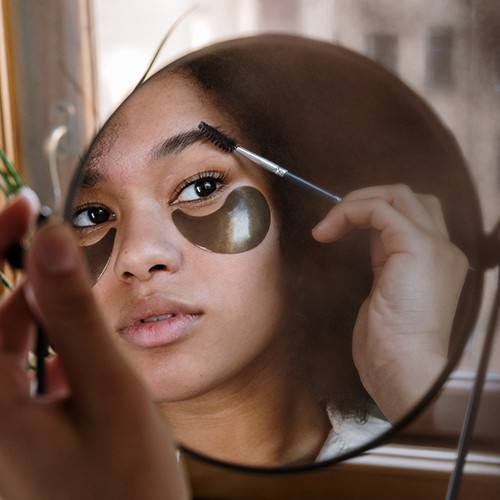Common Questions About Skincare Around the Eyes
Posted by Nikki Wisher on Jan 4th 2021
For nearly a year, we’ve been wearing face masks everywhere we’ve gone. Masks might not be the comfiest things in the world, but if you happen to be self-conscious about aging on your lower face, at least the masks cover those issues. If you’re one of the many who struggle with aging around your eyes, though, you’ve been out of luck.
Now that our eyes are just about the only parts of our faces that are visible to the general public, more and more people have been paying attention to their skincare around the eyes. Great skincare always starts with the right knowledge, though. To help you take care of those peepers, I’ve tackled some of your top eye skincare questions.
Do Cucumbers Really Help Your Eyes?
It’s the spa day stereotype: a skin mask on your face and cucumber slices on your eyes. Do those cucumbers actually do anything, though?
Yes, they really do! Cucumber has an especially high water content, so the slices can restore hydration around your eyes. If the slices are cool, they can also reduce inflammation and puffiness around your eyes. On top of all this, cucumbers have other skin-benefiting ingredients like vitamin C and folic acid.
There’s a caveat, though: the hydration gain you’ll get from those cucumber slices is temporary. Pair the soothing treatment with an eye moisturizer to lock in that hydration and keep your skin looking smoother and more youthful.
Do I Actually Need Eye-Specific Skincare Products? Or Are They the Same as Products for Other Areas?
This is a common question, but rest assured that yes, eye care products are different from skincare products for other areas of your face.
The skin around your eyes is unique. It’s thinner and more delicate than skin in other areas. Eye care products are specifically formulated to provide more benefits for this skin while being gentle enough to avoid irritation in these delicate spots. It’s worth investing in skincare products dedicated to keeping your eye area young and healthy, especially if you’re not crazy about the idea of Botox or filler injections in those sensitive spots.
Can Squinting Give Me Crow’s Feet?
Crow’s feet are often the first real sign of aging to appear (oh joy) and that’s because they don’t come from aging alone. Yes, squinting often can make you more prone to crow’s feet.
When you squint and make other facial expressions that create similar creases next to your eyes, you’re activating those tiny muscles in the outer corners of your eyes. When you use those muscles too often, they stop fully relaxing in between squints. When the muscles stay partially tensed, they pinch the skin above them to create those tell-tale crow’s feet creases.
Aging plays a role too. As you get older, your skin becomes thinner and less firm so it’s less able to withstand that creasing and pinching.
So what’s the solution? Use anti-aging eye products to keep your skin as firm as possible. In the meantime, try to set an alarm on your phone so you can consciously relax the muscles around your eyes. You might be surprised how often you’re activating those muscles without realizing it.
Do False Eyelashes Damage My Real Eyelashes?
Falsies are popular for special occasions and even daily wear for some today, as a way to make your lashes look longer and fuller. But could you be holding back your natural lashes from being full and long in the process? The answer: maybe.
It all depends on how you use the lashes and what products you use. If the glue is causing inflammation in your lash line, this could hinder your eyelash growth. You could also hold back your lash growth if you’re accidentally pulling out some natural lashes when you remove your falsies.
On top of this, it’s important to use safe practices and products when you use false lashes. If you overuse the same products without cleaning them, they could create bacterial infections in or around your eyes.
So, is there a way to restore more growth and better health to your natural lashes instead? Yes, there is! Try an eyelash enhancing serum and an eyelash conditioner to nourish your lashes.
How Do I Know When It’s Time to Add an Eye Cream to My Routine?
Eye cream is among the top ways to rejuvenate the skin around your eyes, but most people think of it as something for middle-agers and up. How do you know when it’s time to add an eye cream to your routine?
In truth, it’s always better to prevent aging in the first place than to play catch-up and try to repair it after it happens. For that reason, eye cream is a smart choice for pretty much everyone starting in your early 20s. Keep in mind, though, that your needs might change as you get older, so you might have to change to different eye creams throughout the years.
Protecting Your Peepers
Your eyes are among the first parts of your appearance that people notice when they see you, especially when you’re sporting a mask that covers pretty much everything else. It’s never too early to start taking better care of the skin around your eyes, and now that you know the truth to some of your top eye care questions, you have more tools than ever before.

